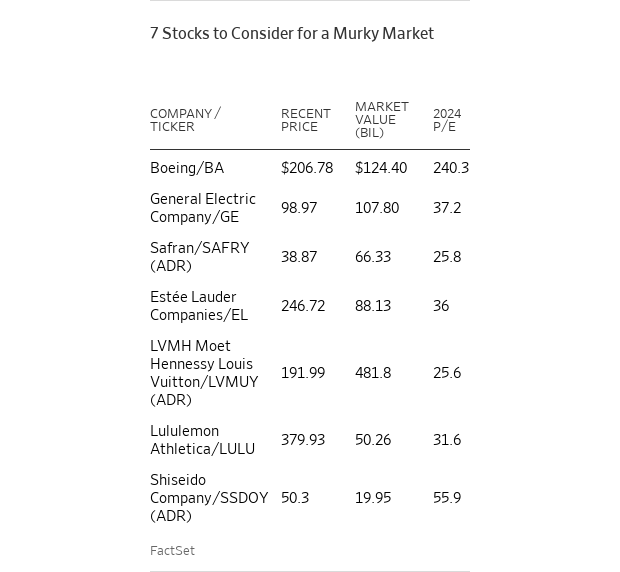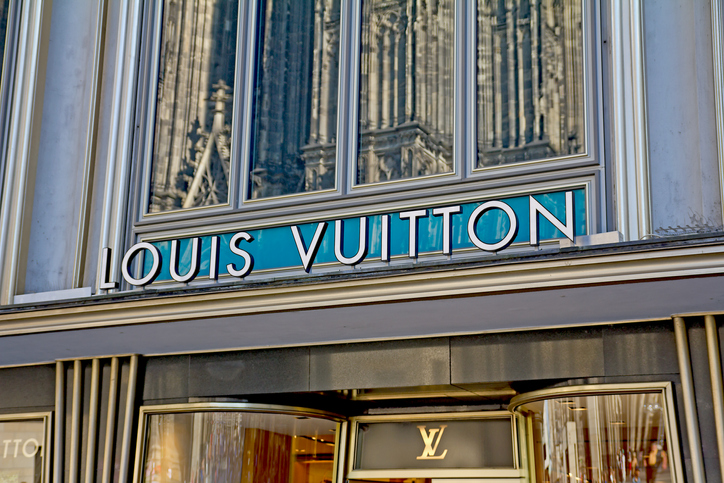Boeing, Estée Lauder, and 5 Other Stocks for a Very Confusing Market
It’s been a wonky year for markets so far—but there may be several stocks to play it.
While the Federal Reserve has yet to give a clear signal it will pause interest rate hikes, many investors believe that rates will moderate in 2023 as the central bank works to fight inflation. As a result, stocks have rallied this year, with the S&P 500 up 9% andBig Tech companies generating stellar earnings results all in the face of bank worries and recession fears.
Several fund managers who attended the Morningstar Investment Conference are still looking for bargains—even though many economists such as Bank of America’s Michael Gapen see a case for a mild economic slowdown in 2023. The managers are focused on players in the aerospace industry, given the healthy outlook for travel, and companies with strong pricing power that can weather big swings in consumer demand.

Fidelity Investments portfolio manager Matt Fruhan during a panel on Wednesday said that he’s bullish on U.S. commercial aerospace firms such as Boeing (ticker: BA) and General Electric Company (GE). Passenger air traffic is growing and “we are still in the recovery phase of covid,” said Fruhan, who has been investing in the theme for the past 12 months to 18 months.
Demand for air travel in February—as measured by revenue and distances flown—rose 55.5% versus a year ago, according to the latest air traffic report from the International Air Transport Association, which represents some 300 airlines. That figure, however, is still lower than pre pandemic levels, matching about 85% of global traffic witnessed in February 2019.
Besides the U.S. names, Fruhan also likes French aerospace supplier Safran (SAF.France). It’s an engine manufacturer that also sells units like seats and lavatories and offers repair services, adding a recurring revenue stream.
Nate Velarde, co-portfolio manager of the Chautauqua International Growth Fund, bought Safran shares in 2022. He sees the proliferation of low-cost airlines as a tailwind—and is impressed by the company’s successive price increases in its spare parts business in 2021 and about 10% in November last year.
“Given the broad environment we are faced in, you need to find companies that have the ability to protect margins [through] pricing power,” Velarde told Barron’s at the conference.

Spencer Adair, a portfolio manager and partner at Baillie Gifford, says luxury cosmetic brand stocks are the best examples of pricing power, given makeup stands as “absolutely critical” in any macro environment.
One of his favourites: Estée Lauder (EL), which was a Barron’s pick last year. Shares are down 0.6% so far this year: Results for the December ended quarter showed prolonged Covid-19 lockdowns affected foot traffic at bricks-and-mortar stores in China. However, Adair expects these headwinds to abate, as China’s reopening gathers steam and Estée Lauder accelerates its direct to consumers sales.
Adair, who manages the nearly $300 billion investment firm, also likes Japanese skincare brand Shiseido (SSDOY), which reported a 6% drop in its China business last year. Adair cited demand from Chinese travellers, who are known for their interest in multi-step skincare regimens, as a tailwind.
Natasha Kuhlkin, a large-cap growth equity portfolio manager at Jennison Associates, sees strength in global luxury consumer brands. While sitting on a panel about the disruption of growth stocks with Adair and Fruhan, Kuhlkin named LVMH Moët Hennessey Louis Vuitton (LVMUY) and athleisure brand Lululemon Athletica (LULU). “There’s a controlled supply” of these companies, she said, adding that they “are starting to appeal to more consumers.”
Lululemon trades at 31.6 times forward earnings, lower than its 40.5 times five-year average. LVMH, meanwhile, is trading at 25.6 times nearly matching its average five-year price-to-earnings ratio.
Ultimately, it’s all about customer demand and how far can people stretch their frugality. Switching to a cheaper laundry detergent may work for some, but quitting on their go-to-gym leggings might be asking too much—giving companies with pricing power a leg up.
 Copyright 2020, Dow Jones & Company, Inc. All Rights Reserved Worldwide. LEARN MORE
Copyright 2020, Dow Jones & Company, Inc. All Rights Reserved Worldwide. LEARN MORE
This stylish family home combines a classic palette and finishes with a flexible floorplan
Just 55 minutes from Sydney, make this your creative getaway located in the majestic Hawkesbury region.
Continued stagflation and cost of living pressures are causing couples to think twice about starting a family, new data has revealed, with long term impacts expected
Australia is in the midst of a ‘baby recession’ with preliminary estimates showing the number of births in 2023 fell by more than four percent to the lowest level since 2006, according to KPMG. The consultancy firm says this reflects the impact of cost-of-living pressures on the feasibility of younger Australians starting a family.
KPMG estimates that 289,100 babies were born in 2023. This compares to 300,684 babies in 2022 and 309,996 in 2021, according to the Australian Bureau of Statistics (ABS). KPMG urban economist Terry Rawnsley said weak economic growth often leads to a reduced number of births. In 2023, ABS data shows gross domestic product (GDP) fell to 1.5 percent. Despite the population growing by 2.5 percent in 2023, GDP on a per capita basis went into negative territory, down one percent over the 12 months.
“Birth rates provide insight into long-term population growth as well as the current confidence of Australian families,” said Mr Rawnsley. “We haven’t seen such a sharp drop in births in Australia since the period of economic stagflation in the 1970s, which coincided with the initial widespread adoption of the contraceptive pill.”
Mr Rawnsley said many Australian couples delayed starting a family while the pandemic played out in 2020. The number of births fell from 305,832 in 2019 to 294,369 in 2020. Then in 2021, strong employment and vast amounts of stimulus money, along with high household savings due to lockdowns, gave couples better financial means to have a baby. This led to a rebound in births.
However, the re-opening of the global economy in 2022 led to soaring inflation. By the start of 2023, the Australian consumer price index (CPI) had risen to its highest level since 1990 at 7.8 percent per annum. By that stage, the Reserve Bank had already commenced an aggressive rate-hiking strategy to fight inflation and had raised the cash rate every month between May and December 2022.
Five more rate hikes during 2023 put further pressure on couples with mortgages and put the brakes on family formation. “This combination of the pandemic and rapid economic changes explains the spike and subsequent sharp decline in birth rates we have observed over the past four years,” Mr Rawnsley said.
The impact of high costs of living on couples’ decision to have a baby is highlighted in births data for the capital cities. KPMG estimates there were 60,860 births in Sydney in 2023, down 8.6 percent from 2019. There were 56,270 births in Melbourne, down 7.3 percent. In Perth, there were 25,020 births, down 6 percent, while in Brisbane there were 30,250 births, down 4.3 percent. Canberra was the only capital city where there was no fall in the number of births in 2023 compared to 2019.
“CPI growth in Canberra has been slightly subdued compared to that in other major cities, and the economic outlook has remained strong,” Mr Rawnsley said. “This means families have not been hurting as much as those in other capital cities, and in turn, we’ve seen a stabilisation of births in the ACT.”
This stylish family home combines a classic palette and finishes with a flexible floorplan
Just 55 minutes from Sydney, make this your creative getaway located in the majestic Hawkesbury region.






















